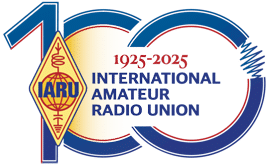Listed below are Morse Code keys known to have been mass-produced in New Zealand for use in landline telegraphy, commercial radiotelegraphy, the military, or amateur radio.
This page features paddles for use with an electronic keyer. Please see the links at the bottom of the page for other types of key made in New Zealand.
If you know of other keys, or have additional information of photographs to share, please contact the editor.
Gary Bold’s simple dual-lever paddles design
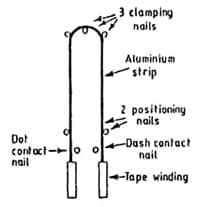 In the August 1988 edition of the NZART’s Break-In magazine, the Morseman Gary Bold ZL1AN (SK) described dual-lever paddles that could be home-made in five minutes at near-zero cost.
In the August 1988 edition of the NZART’s Break-In magazine, the Morseman Gary Bold ZL1AN (SK) described dual-lever paddles that could be home-made in five minutes at near-zero cost.
Gary found that his simple paddles could handle speeds up to 30 words per minute.
Peter Byam’s 1989 single-lever paddles design
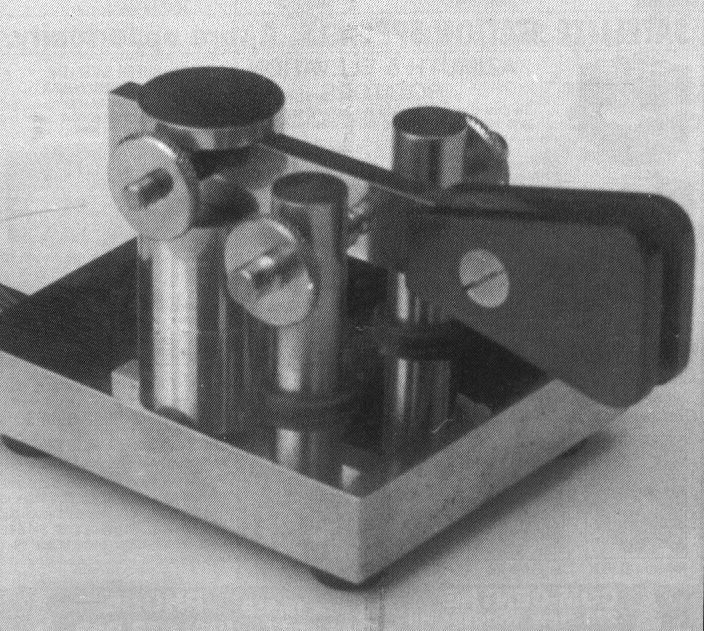
Peter Byam’s 1989 Morse paddles
This design, by Peter Byam ZL2JJ (SK), was published in the December 1989 edition of the NZART magazine Break-In.
A few years later, Peter began producing the highly regarded Zedder dual-lever paddles, also shown on this page.
Galbraith GK11 compact dual-lever paddles
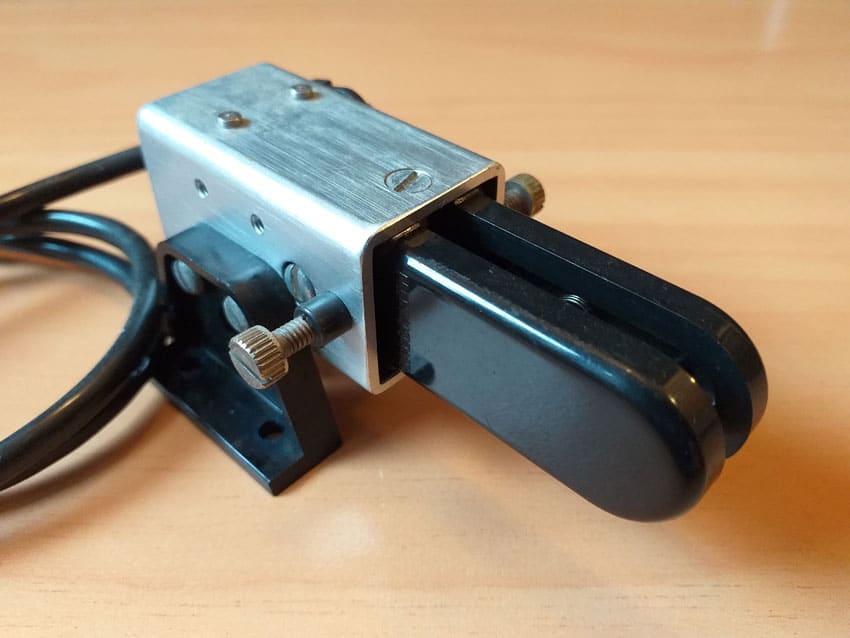
Galbraith dual-lever paddles. Photo: ZL1NZ
These well-known paddles were in production for over 20 years. I understand they were designed in 1978 by Winton Bell (I am still seeking confirmation of this). Winton reported in the November 1995 edition of Break-In that between 8000 and 10,000 of these paddles had been produced and that they were in use in “all the corners of the world”. Like other Galbraith products, these paddles were a project of the Christchurch Amateur Radio Club (NZART Branch 05).
In 1992 the paddle was sold with a Super CMOS electronic keyer. Later, it was sold as part of the Galbraith KEA electronic keyer, designed by Kelvin Barnsdale ZL3KB. The KEA is a fairly rate item, with only 45 sold, including 10 that went to the USA.
“The project was created to use up the remaining GK11 paddles, so we only ordered enough obsolete (Curtis) 8044ABM keyer chips to get us through,” Kelvin recalls.1
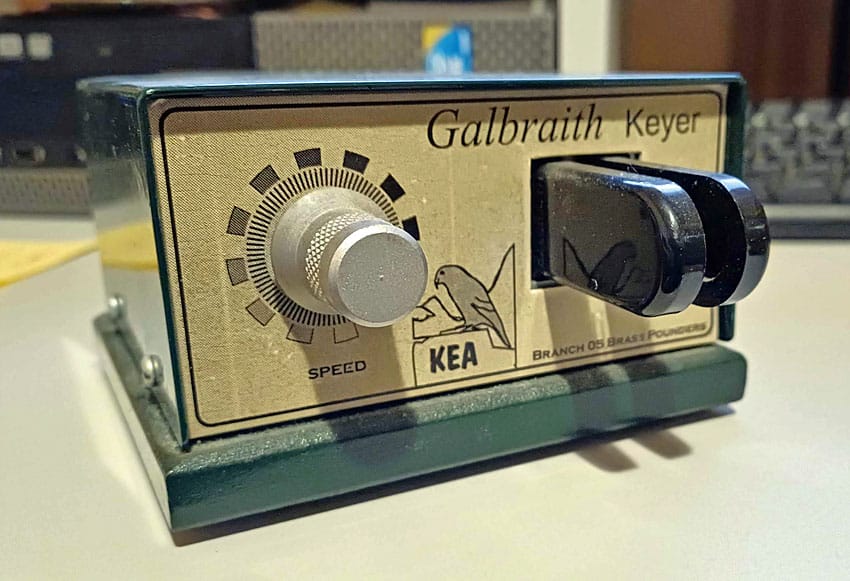
Galbraith KEA electronic keyer. Photo ZL4KX
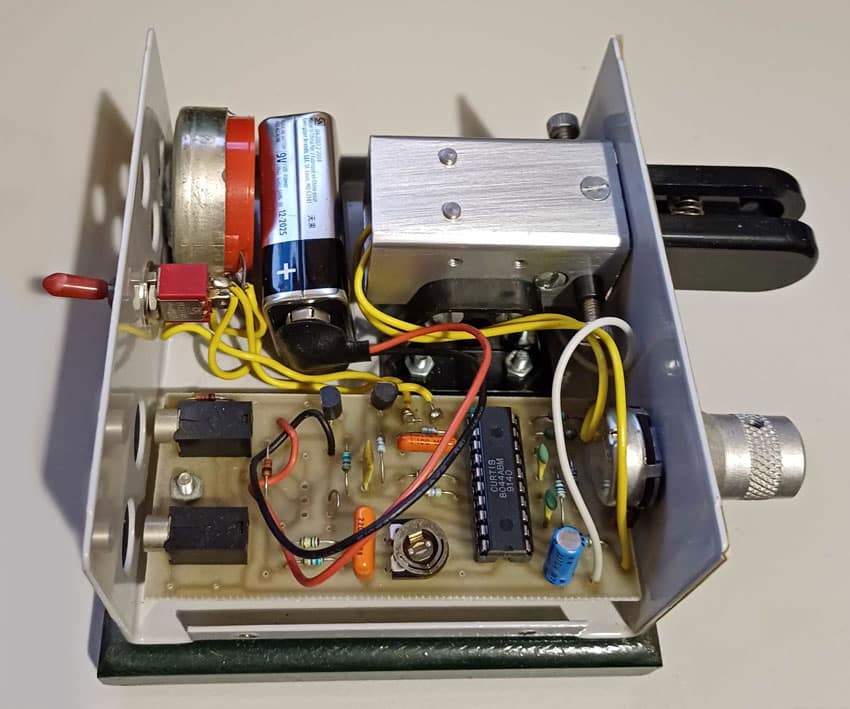
Inside the KEA. Photo ZL4KX
In the 1997/8 NZ Callbook, the KEA was advertised at $135 in kit form, or $165 assembled. The price was the same in the 1999/2000 NZ Callbook.
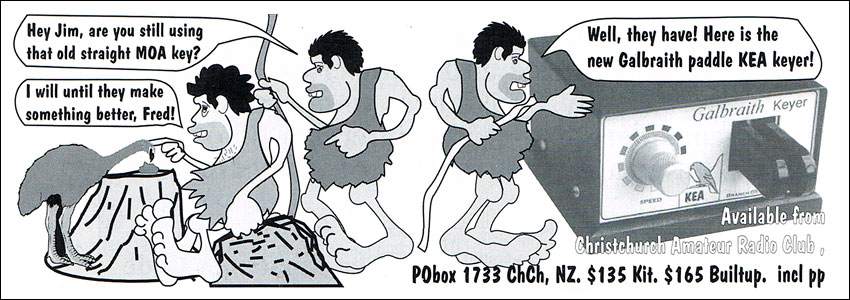
Advertisement for the NZ-made Galbraith ‘KEA’ keyer with built-in paddles. NZ Callbook, 1997/8
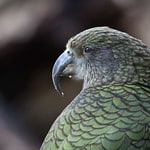 * An explanation for overseas readers: This product has a clever name which probably wouldn’t be understood outside New Zealand. The kea is an extremely ingenious and endangered New Zealand parrot (see photo). In New Zealand English, the words kea and keyer are quite similar in pronunciation.
* An explanation for overseas readers: This product has a clever name which probably wouldn’t be understood outside New Zealand. The kea is an extremely ingenious and endangered New Zealand parrot (see photo). In New Zealand English, the words kea and keyer are quite similar in pronunciation.
The moa was a large, flightless bird – now extinct.
Galbraith paddles owner’s manual.
“Mac” McTurk’s simple electronic paddles design
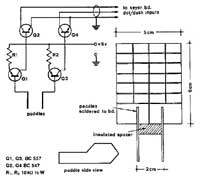 In the NZART Break-In May 1987, Mac McTurk ZL1BEK published his design for a Simple Electronic Paddle which has no moving parts.
In the NZART Break-In May 1987, Mac McTurk ZL1BEK published his design for a Simple Electronic Paddle which has no moving parts.
Taylormade dual-lever paddles
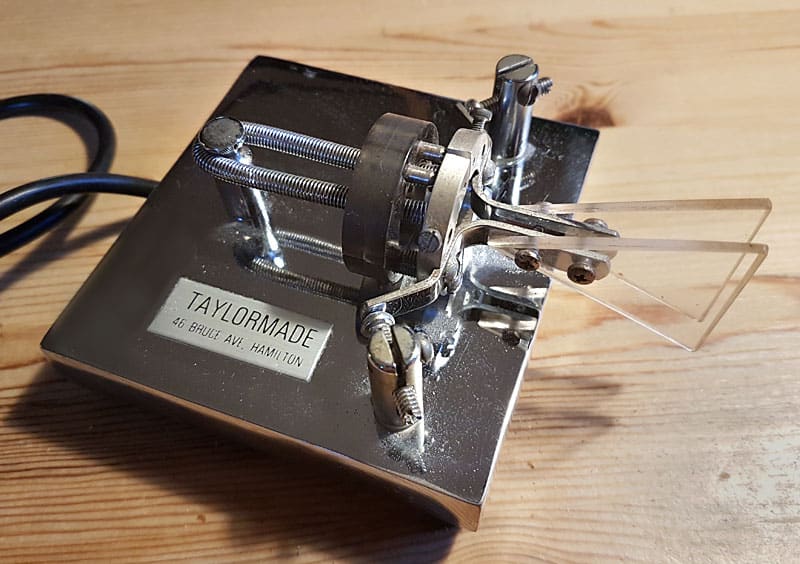
Taylormade paddles. Photo: SM5LNE
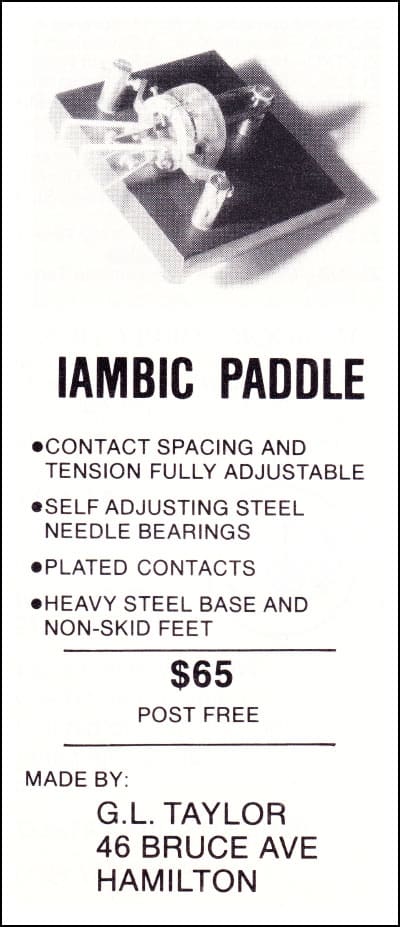
Break-In magazine, September 1983
Both black-painted and chrome bases have been seen.
It is believed that they were first made in the early 1980s and then production ceased for a while, to be resumed in 1989.
Gerry’s last known address was on Waiheke Island, but he is no longer at that address and his callsign is no longer registered.
“I purchased one of these keys from Gerry at the Cambridge Junk Sale (1987, I think). He had a trade table in the hall. I recall it was quite crowded and I spotted a very nice looking paddle. Had a quick chat with Gerry who told me it was made in his workshop and was a direct copy of a Bencher. I can’t remember where the key ended up, but it was definitely used in Field Day 1988, ’89 and ’90.”
– Paul ZL1AJY (Oct 2021)
Unknown dual-lever paddles
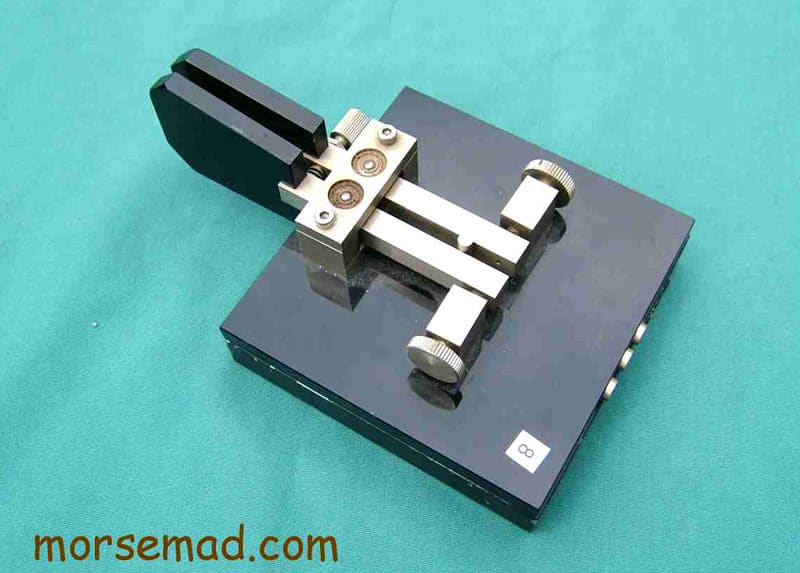
According to the website morsemad.com, this photograph shows “A New Zealand Twin Lever Paddle key, unknown maker or model.”
Tony Wilkes “El-Bug” paddles
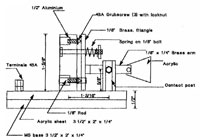 In October 1997, the NZART’s Break-In magazine published designs by Tony Wilkes ZL3SLH (SK) for single and dual-lever paddles without bearings.
In October 1997, the NZART’s Break-In magazine published designs by Tony Wilkes ZL3SLH (SK) for single and dual-lever paddles without bearings.
Ron Willcocks paddles
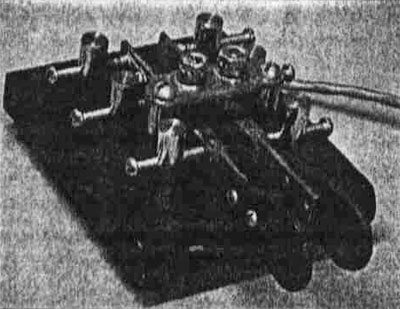 Ron designed and built two models of paddles.
Ron designed and built two models of paddles.
His “original” (pictured) has two aluminium 3/8″ square blades with adjustable silver contacts on them. The blades are adjustable for paddle spacing, gap adjustment and tension. The blade pivots are spring steel rod and are adjustable to remove “slop”. The base is 16mm steel plate 100mm square.
Ron’s later paddles do not have pivot bearings, but use a hinge, similar to a Brown Bros Paddle. Ron made the hinges from brass shim. The blades are also made of brass and the contacts make on a central “earthed” pillar. These paddles, like Ron’s original, are fully adjustable for paddle spacing, contact gap and spring tension. They also have a base made from 16mm steel plate.
Zedder dual-lever paddles by Peter Byam
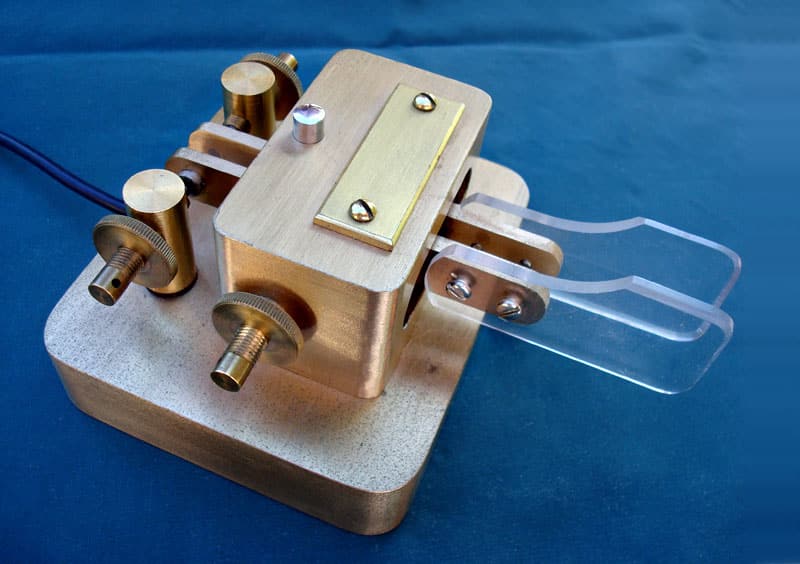
Zedder paddles. Photo: ZL2WT
These could be described as the “Rolls-Royce” of New Zealand paddles. They were made by Peter Byam ZL2JJ (SK). The first of these paddles was made in 1994 and as at March 2000, twenty had been made. Ten are in New Zealand and the rest in USA, UK and Iceland. Barry Kirkwood wrote a review in the October 1996 edition of Morsum Magnificat.
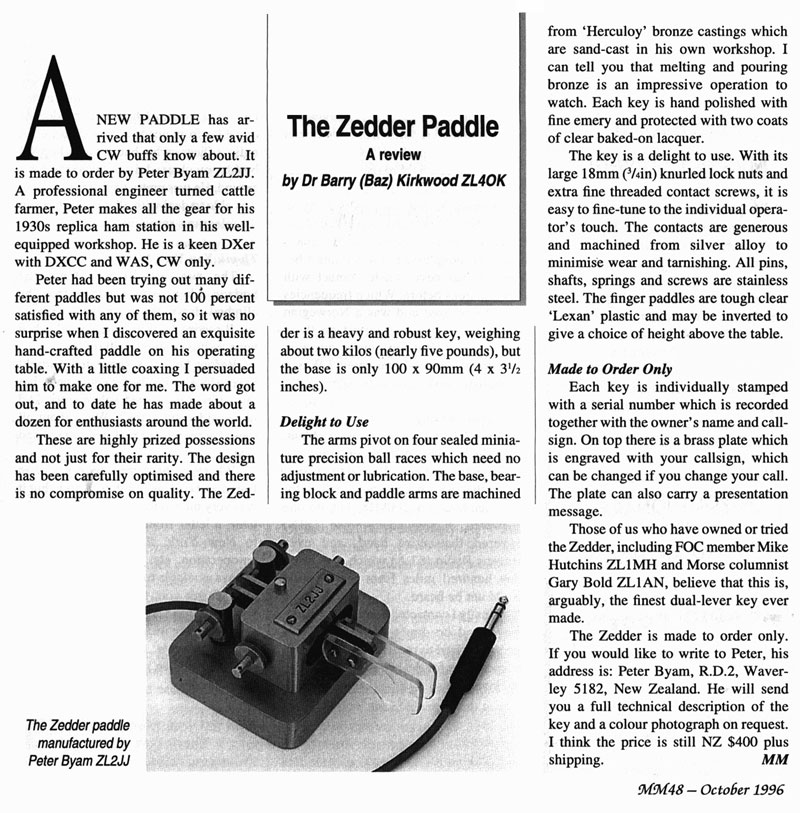
There is one small correction to Baz’s article – the bearings are shielded – not sealed.
“Peter told me that he named it ‘Zedder’ because he came to NZ in the US Army, and ‘Zedder’ was their colloquialism for Kiwis (instead of their own ‘Zee-er’, I guess).”
– Mike ZL1MH (June 2023)
Where are the Zedders? (updated June 2023)
NR ??? – Barry ZL4OK (purchased new from Peter Byam – see article above)
NR 004 – Mike ZL1MH (purchased new from Peter Byam)
NR 005 – Bede ZL4KX (purchased new from Peter Byam in 1994)
NR 010 – Bruce K1AJ (purchased new from Peter Byam in the 1990s)
NR 011 – Jan SM5LNE (discovered at Dayton Hamvention in 2022)
NR 020 – David ZL2WT (purchased new from Peter Byam after 1996)
ZL1BHK dual-lever paddles
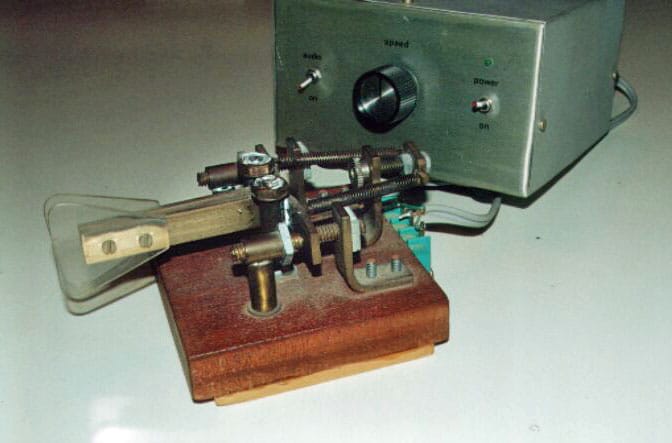
ZL1BHK dual-lever paddles
ZL1BHK drew the design for these paddles in 1985. It is not known how many were made.
More New Zealand keys
Straight keys
Semi-automatic keys (bugs)
Training keys
Notes
1. Email, July 2024



